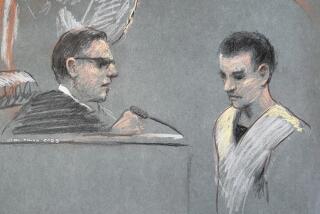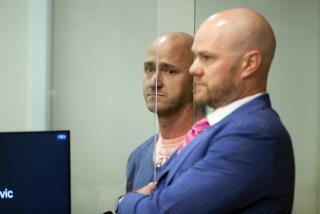3 Mideast Hijackers Indicted : Airline Security Group Hears News From Meese
The three men responsible for the much-publicized hijacking of Trans World Airlines flight 847 last summer, during which a Navy man was beaten and shot to death, have been indicted by a federal grand jury in Washington, Atty. Gen. Edwin Meese III disclosed Thursday in San Diego.
Meese’s statement about the indictments is the first time the outcome of the grand jury proceedings has been made public.
The attorney general made his disclosure during a speech to a convention of airline security personnel. Among those in the audience was TWA Capt. John Testrake, the pilot of the flight hijacked by militant Lebanese Shia Muslims.
Justice Department spokesman Patrick Korton confirmed the indictments to the Associated Press, although he declined to elaborate.
Arrest warrants and criminal complaints against the hijackers were issued, but Korton refused to say whether the indictments charged the three with air piracy and murder. “Clearly, we’d be looking in those areas,” Korton told AP.
Meese said none of the accused is in custody, but that he was confident they would be caught.
“They can’t hide forever,” Meese told reporters after his speech. “If they do stay in countries that harbor terrorists, which they appear to be doing at the present time, they’re going to have a very limited terrorist career in the future.”
Meese, who addressed the International Assn. of Airline Security Officers convention at the Town and Country Hotel, said the safe return of all but one of the passengers on TWA Flight 847 was evidence that the U.S. policy of refusing to negotiate with terrorists works.
“We made clear from the start that the terrorists would have nothing to gain by escalating the threat of violence against the hostages,” Meese said. Navy diver Robert Dean Stethem, a passenger on the Athens-to-Rome flight, was shot to death in the early stages of the hostage crisis.
Meese said the Reagan Administration would maintain the no-negotiations policy, coupled with efforts to better understand the motivations of terrorists and a firm resolve to “never abandon the rule of law” in dealing with acts of terror.
According to airline security officials, the TWA hijacking illustrated that hijackers are not D.B. Coopers anymore--not madmen or money grubbers commandeering jets for thrills or a big payoff. In 1971, Cooper demanded $200,000 in cash and three parachutes and bailed out of a commercial jet over Oregon. He has never been found.
Instead, today’s air pirates and bombers are sophisticated terrorists, out to commandeer public attention for a cause as much as to divert jets from their intended destination, the security experts say.
The attention of the security professionals at the convention was focused on items geared to countering such 1980s-style threats to airline safety.
“If we knew the inside of a terrorist’s mind, we’d know how to combat hijackings,” said Stephen Gardella, vice president of security for San Diego-based Pacific Southwest Airlines, who is chairman of the association.
To better understand their opponents, security officers from dozens of airlines and federal and local law enforcement officials held a closed-door session with Testrake, the TWA pilot who, along with his passengers, was held hostage in Beirut for more than two weeks in June.
Gardella said Testrake answered questions about his physical capacities during the ordeal, about the Muslim hostage-takers’ weapons and communications systems and about the plane’s operations during the 17-day crisis.
To Gardella, among the most striking aspects of Testrake’s replies was the degree to which the pilot felt unprepared for the ordeal. “He explained to us that there were things happening that he had no knowledge of from his training,” Gardella said.
In an interview after his meeting with the security officials, Testrake--who resumed flying domestic routes in August--said security precautions in air travel generally are adequate. To quell air terrorism, he said, governments need mainly to work on removing the political concerns that prompt terrorist acts.
“We’re going to have to do a better job of understanding the situation around the world in these trouble spots and use our American sense of fair play to make sure everybody has an equal shot at opportunity,” Testrake said.
Meese, while calling for continued international cooperation against terrorism, said airlines should work with government agencies to improve security technology and procedures, perhaps including tighter security checks of airport ground crews.
“We’ve got to make sure we’re at least as up-to-date as the terrorists are,” he said.
More to Read
Sign up for Essential California
The most important California stories and recommendations in your inbox every morning.
You may occasionally receive promotional content from the Los Angeles Times.









